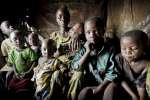Ministerial Meeting on the Comprehensive Solutions Strategy for Rwandan Refugees Joint Communiqué
Press Releases, 2 October 2015
On 2 October 2015, a Ministerial meeting was convened at UNHCR Headquarters in Geneva to discuss the state of implementation of the Comprehensive Solutions Strategy for Rwandan Refugees and to review key issues and the way forward in bringing the strategy to its conclusion.
Ministerial delegations from the main countries hosting Rwandan refugees (Angola, Burundi, Cameroon, the Democratic Republic of the Congo, Kenya, Malawi, Mozambique, the Republic of the Congo, South Africa, Uganda, Zambia and Zimbabwe) and the Country of Origin (Rwanda), the African Union, and UNHCR (Assistant High Commissioner for Protection and Director of the Regional Bureau for Africa) participated in the meeting and concluded as follows:
1. The Participants recall the conclusions of the Ministerial meeting on the Comprehensive Solutions Strategy for Rwandan Refugees held in Pretoria, South Africa in April 2013. They reconfirm their commitment to bring proper closure to the situation of Rwandan refugees who fled their country before 31 December 1998 and to secure appropriate durable solutions for them.
2. Recognizing that States are at different stages of implementation of the Comprehensive Solutions Strategy, and the need to adopt a differentiated approach in this regard, the Participants commit to implement its main elements and to bring the strategy to its conclusion as soon as possible, but no later than 31 December 2017.
3. The Participants appreciate that, in light of UNHCR's recommendation to States of cessation for this group of refugees, UNHCR will no longer be in a position to operationally support this population after December 2017, except to finalize any remaining jointly-agreed upon activities.
On Voluntary Repatriation:
4. Taking into account efforts to promote voluntary repatriation since the Comprehensive Solutions Strategy was adopted, the Participants agree that organized returns shall come to a close by 31 December 2016.
5. Prior to that date, the Participants will intensify dialogue with Rwandan refugees on the opportunities to benefit from organized voluntary repatriation, including through sensitization campaigns, and to ensure that refugees are able to make free and informed decisions as to return.
6. The Participants will endeavor to identify all affected refugees before the end of January 2016, with a view to identifying appropriate solutions, unless there are exceptional operational constraints.
7. The Government of Rwanda will ensure the safe and dignified return and reintegration of all refugees, and will take all necessary measures to this end.
On Local Integration:
8. The Participants commit to intensify efforts to facilitate local integration opportunities for those who wish to remain in the country of asylum.
9. The Participants will explore the acquisition of an alternative legal status by waiving or reducing related fees and easing administrative requirements. The Government of Rwanda commits to furnish national passports to those refugees who require them, in accordance with the law.
10. The Participants recognize the need to prevent former refugees from being left without a legal status and/or becoming at risk of statelessness and agree to take all possible measures, including exploring the acquisition of citizenship, to avoid such an outcome.
11. The Participants call for close collaboration between the governments, UNHCR and the African Union, on such issues as documentation, local solutions, and citizenship.
On Exemption Issues:
12. The Participants reaffirm the need to avoid large-scale exemption procedures to the extent possible by identifying alternative solutions for refugees.
13. Where needed, the Participants call on UNHCR to assist States in developing and implementing fair and efficient exemption procedures.
14. The Participants recognize that for those persons who are determined to no longer be in need of international protection, a transitional phase will be applied, ending no later than 31 December 2017, during which time durable solutions will be vigorously pursued and assistance gradually phased out.
15. The Participants further recognize that for those persons found still to be in need of international protection as refugees, such protection will continue to be provided as durable solutions are pursued.
Concluding Observations
16. The Participants, in close cooperation and with the support of UNHCR, will work closely to design the necessary work-plans to ensure completion of the Comprehensive Solutions Strategy as soon as possible, but no later than 31 December 2017. The Participants call on the international community to support the process of finding solutions to this situation and UNHCR will raise this issue in the context of the Solutions Alliance.
17. The Participants commit to regularly communicate and exchange information on progress related to the above conclusions and to meet again by mid-2016.






























































